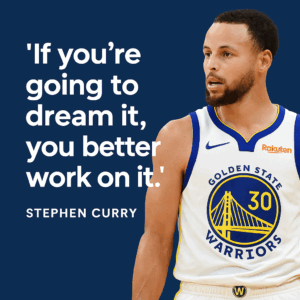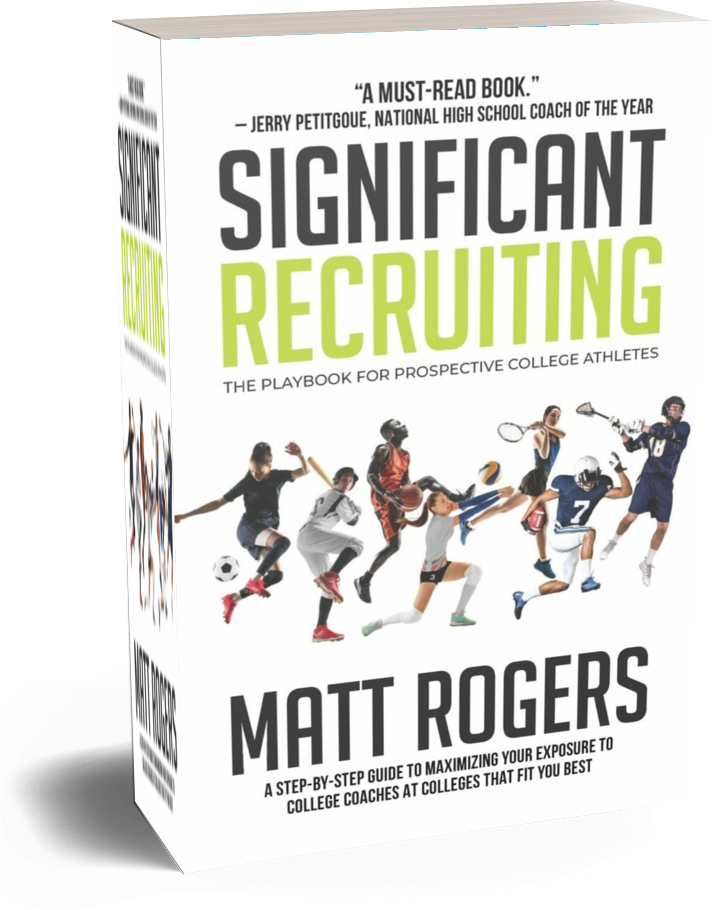“You don’t have to be great to start, but you do have to start to be great.” -Zig Ziglar
Let’s get to the heart of it. Is your child committed to doing the work to get recruited? That commitment is everything. Commitment to getting enough sleep every night. Commitment to putting the work into their classroom assignments and study habits. Commitment to eating right. Committed to working on their skills and strength and athleticism each day. Committed to building healthy relationships with teammates, coaches, and teachers. Committed to communicating with college coaches. This last one is the hard one for most kids; even those Valedictorian-types struggle to have the courage to contact college coaches.
If your child has a great attitude, good grades, above average ability in their sport, above average size/speed/athleticism, and a proven track record of personal and/or team success, then they have everything they need to play at the college level. None of that matters if they won’t put themselves out there.
I am sorry mom/dad/grandparents/aunts & uncles, college coaches simply do not want to hear from you. You are biased and, often-times, unqualified to evaluate a college prospect. You love your kid. You believe in your kid. There is absolutely nothing wrong with that. In fact, it is a great thing. However, college coaches want to hear from two people…and in this order…(1) your child and (2) your child’s coach. That’s it. If you or a family member are reaching out to college coaches on your child’s behalf, it is a HUGE red flag for college coaches…no matter how talented or how much potential your child has.
Here are the DO’s:
- Get evaluated by a college coach, scout and former college/professional athlete or coach (know your real value!)
- Get good game film (or skill video for baseball, softball, golf) of them playing their sport
- Build an on-line profile/resume (yes, the free versions are just as good) with their film, grades, schedule and contact information
- Create a realistic “Attack List” (See Chapter 6 of Significant Recruiting) of 50-100 schools that fit your child’s athletic reality and academic, geographic and social fit
- Email 3-5 of those coaches (Head Coach and Assistant Coaches) each week. [I am interested in you. I am calling to see if you may be interested in me?]
- Follow-up those emails with a phone call to each of those coaches within a week of sending the email.
- Create a list of questions to ask the coach when they answer or call back (again, See Chapter 6 of Significant Recruiting), so you get a sense if they need your child, are truly interested in your child and what their process is to recruit your child.
Here are the DO NOT’s:
- Do not spend money chasing camps and showcase invites (1-2 per year are great, but make sure there will be coaches interested in your child in attendance before you spend the money.)
- Do not ignore coaches when they email or call. You need to learn about every school and every coach. Why are they interested in you? What do they have to offer you? What happens if that coach ends up at a school you do want to attend? Build relationships. Build leverage.
- Do not expect or ask for scholarship or NLI money.
- Do not expect or ask to start.
- Do not chase opportunities (i.e. walk-ons, preferred walk-ons, tryouts after you’ve enrolled) that demonstrate they do not fully believe in you
- Do not pick schools because of location or size or division level – none of those things matter if the school doesn’t have your majors or if you don’t like the coach or the players or the opportunity to contribute to the team right away.
- Do not apply to schools until you know the coach at that school is seriously interested in you
In the end, if your child is good enough to play in college, and they are not being recruited, the only person you have to blame is your child. They need to put 10 minutes per week into their recruitment emailing and calling the coaches at schools that fit them best. That’s it! The only way they fail is if they aren’t good enough, or they are simply too late in the process. Remember, when coaches fill their roster, they stop recruiting. Don’t be the last one to the table!
Enjoying these blogs? Want to schedule a free 30-minute coaching assessment with Coach Rogers? You can do so here: https://www.significantcoaching.net/
Interested in Coach Rogers’ Book on College Recruiting? You can find it here: https://bit.ly/Matt-Rogers-Significant-Recruiting-Amazon






